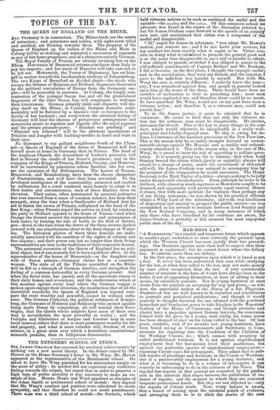TOPICS OF THE DAY.
THE QUEEN OF ENGLAND ON THE RHINE.
ALL Germany is in commotion. The Rhine-lands are the centre of attraction ; and potentates and nobles, with sight-seers titled and untitled, are flocking towards them. The progress of the Queen of England up the yanks of the Rhine and Main to Coburg will be as striking and animated a succession of pageants as any of her home progresses, and of a character entirely German. The Royal Family of Prussia are already awaiting her on the Rhine. Her cousin of Brunswick returns post-baste from Italy to pay his respects ; and her uncle of Hanover will take care not to be left out. Metternich, the Nestor of Diplomacy, has set him- self in motion towards his bacchanalian territory of Johannisberg.. The two Kings of Brentford on divided chairs—the rivals who occupy the thrones of Belgium and Holland, fragments dissevered by the political convulsions of Europe from the Germanic em- pire—will be peaceably in presence. At Coburg, the kingly con- centration of the younger Saxon line and all the grand-ducal fragments of the elder Saxon line will congregate to welcome their kinswoman. German princely pride and etiquette will dis- play itself on the Rhine ; at Coburg, German domestic senti- mentality will be flattered by a Queen's visit en bourgeois to the family of her husband ; and everywhere the artistical feeling of Germany will lend the charms of picturesque arrangement and sumptuous music to regulate and dignify alike the royal pageant and the private pleasure-party. "Himmel wie priichtig " and "Himmel wie riihrend " will be the alternate ejaculations of Friiulein and Jungfer with knitting-needles in hand and tears in their eyes. No disrespect to our gallant neighbours South of the Chan- nel—a Queen of England of the house of Brunswick will feel herself more at home in Germany than in France. The head of the Anglican Church, the descendant of Luther's protector, will find in Saxony the cradle of her house's greatness ; and in the company of the Kings of Prussia, Holland, Saxony, and Hanover, will be surrounded by potentates whose families, like her own, are the creatures of the Reformation. The houses of Nassau, Brunswick, and Brandenburg, have been the chosen champions of Protestantism, and well have they been rewarded. To the developed intelligence of the commonalty, animated and exalted by enthusiasm for a creed rendered more homely to adapt it to their habits and circumstances, each of these families owes its elevation. Their union, often interrupted by personal jealousies but ever renewed from a sense of common interest, has been their strength, since the time when a Stadhouder of Holland lent his aid to fasten the crown of Prussia, self-placed on the head of the first King—when Prussia repaid the service in kind, by crushing the party in Holland opposed to the house of Nassau—and when George the Second assured the independence and permanence of both states, by turning the tide of battle in the field of Dettin- gen—down to the time when the forces of the three crowns dashed onward with one simultaneous cheer to the final charge at Water- loo. The historical glories of these three families are indis- solubly associated with the assertion of the rights of citizens and free inquiry; and their power can last no longer than their living representatives are true to the traditions of their respective houses. The autumnal excursion of the Queen of England has no poli- tical object, but it can scarcely fail to have a political effect. As the representative of the house of Brunswick—as the daughter and wife of Saxon princes—Germany claims her as a country- woman. The state of all the Princes assembled on the Rhine will be felt as a triumph of German families, and strengthen the feeling of a common nationality in every German present. And when the festal train has passed, and all the spectators return to their daily homes and avocations, and the controversies which at this moment agitate every land where the German tongue is spoken again engage their attention, the recollection that of all the assembled monarchs the Queen of England was beyond com- pare the most wealthy and powerful, cannot be without influ- ence. The German Catholics, the political reformers of Konigs- berg, the Germans of Holstein and Schleswig who protest against being made Danes by compulsion, all will remind their Sove- reigns, that the Queen whose subjects have most of their own way is nevertheless the most powerful in reality ; and the Guelphs and Ghibelines of Aargau and Lucerne may in some lucid interval reflect that there is more permanent security for life and property, and what is more valuable still, freedom of con- science, in a great state over which a hereditary constitutional monarch presides, than in Lilliputian democracies.


























 Previous page
Previous page